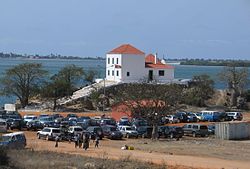National Museum of Slavery (Angola)
- National Museum of Slavery (Angola)
-

Museu Nacional da Escravatura, Luanda
The National Museum of Slavery (Portuguese: Museu Nacional da Escravatura) is located in Morro da Cruz, Luanda, Angola.
The museum was founded in 1997 by the National Institute of Cultural Patrimony, with the objective of depicting the history of slavery in Angola. The museum adojins the Capela da Casa Grande, a 17th Century structure where slaves were baptised before being put on slave ships for transport to the Americas.
The museum displays hundreds of items utilised in the slave trade, and is located in the former property of Álvaro de Carvalho Matoso, captain of the presidio of the Forte de Ambaca, Fortaleza da Muxima, and Forte de Massangano in Angola, and one of the largest slave-traders on the African coast in the first half of the 18th Century. Matoso died in 1798, and his family and heirs continued in the slave-trade until 1836, when a decree by Maria II of Portugal prohibited the export of slaves from the Portuguese Empire.[1]
References
Sources
Coordinates: 8°57′32″S 13°06′17″E / 8.95889°S 13.10472°E / -8.95889; 13.10472
Wikimedia Foundation.
2010.
Look at other dictionaries:
National Slavery Museum (Angola) — National Slavery Museum is a slavery museum in Luanda, Angola.The museum chronicles the history of the slave trade in the country.External links* [http://www.tripadvisor.com/Attraction Review g293763 d622646 Reviews National Slavery Museum Luanda … Wikipedia
Angola — Angolan, adj., n. /ang goh leuh/, n. a republic in SW Africa: formerly an overseas province of Portugal; gained independence Nov. 11, 1975. 10,623,994; 481,226 sq. mi. (1,246,375 sq. km). Cap.: Luanda. Formerly, Portuguese West Africa. * * *… … Universalium
National Slavery Museum — may refer to: United States National Slavery Museum National Slavery Museum (Angola) This disambiguation page lists articles associated with the same title. If an internal link led … Wikipedia
Slavery — Slave redirects here. For other uses, see Slave (disambiguation). Part of a series on … Wikipedia
Slavery in ancient Greece — Funerary stele of Mnesarete; a young servant (left) is facing her dead mistress.[1] Attica, circa 380 BC. (Glyptothek, Munich, Germany) Slavery was common practice … Wikipedia
History of slavery — The history of slavery uncovers many different forms of human exploitation across many cultures throughout history. Slavery, generally defined, refers to the systematic exploitation of labor traced back to the earliest records, such as the Code… … Wikipedia
Louisiana State Penitentiary — For similarly named locales, see Angola (disambiguation). Angola Unincorporated community Louisiana State Penitentiary … Wikipedia
South Africa — Republic of, a country in S Africa; member of the Commonwealth of Nations until 1961. 42,327,458; 472,000 sq. mi. (1,222,480 sq. km). Capitals: Pretoria and Cape Town. Formerly, Union of South Africa. * * * South Africa Introduction South Africa… … Universalium
Afro-Mexican — Infobox Ethnic group group =Afro Mexican caption = Notable African Mexicans: Vicente Guerrero and José Maria Morelos population =1 Million to 2 Million. popplace =Mexico langs =Spanish rels =Christianity (Predominantly Roman Catholic, with a… … Wikipedia
Cuba — Cuban, adj., n. /kyooh beuh/; Sp. /kooh vah/, n. a republic in the Caribbean, S of Florida: largest island in the West Indies. 10,999,041; 44,218 sq. mi. (114,525 sq. km). Cap.: Havana. /kooh bah/, n. Cubba. * * * Cuba Introduction Cuba… … Universalium

